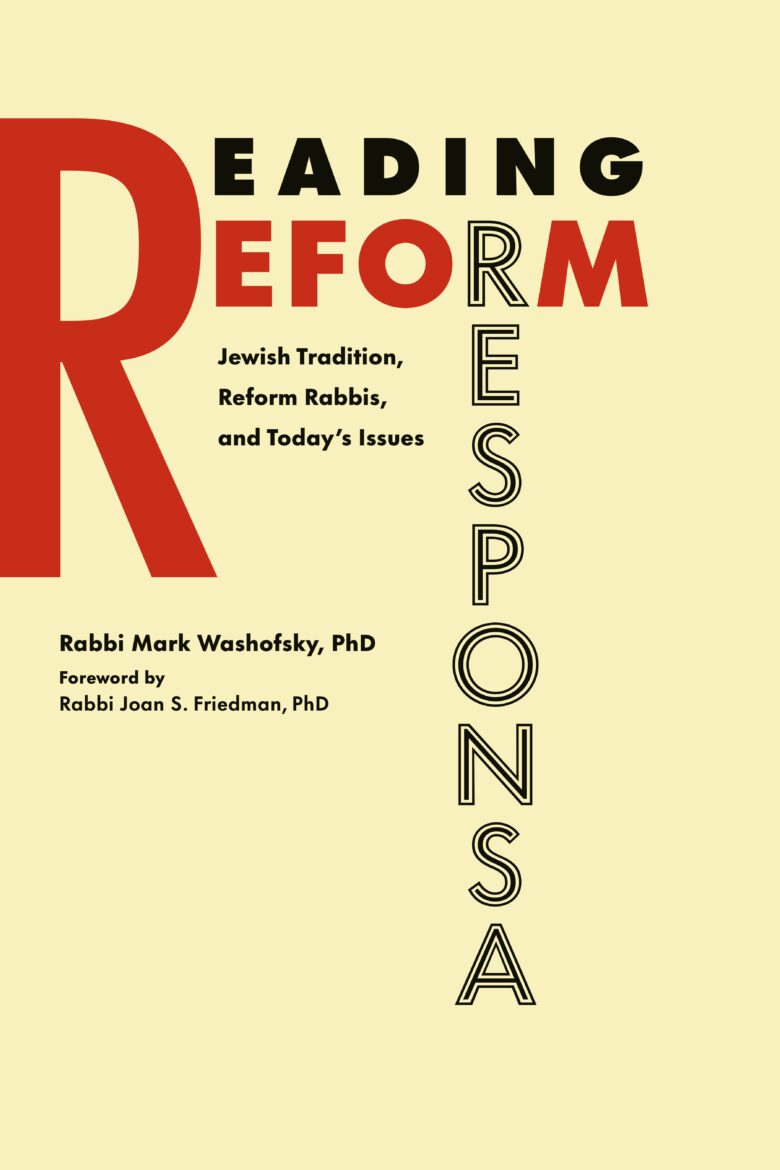March 2024
Drawing from classical halachic literature, Reform religious culture, and modern secular legal theory, this critical new volume demonstrates the history and influence of Jewish law on the Reform Movement’s practice and values.
New York, NY – CCAR Press, a division of the Central Conference of American Rabbis (CCAR), is pleased to announce the publication of Reading Reform Responsa: Jewish Tradition, Reform Rabbis, and Today’s Issues, a new volume on the Reform Movement’s relationship with Jewish law by Rabbi Mark Washofsky, PhD.
The responsa literature, in which rabbis answer questions about halachah (Jewish law), is a vast treasury reaching back nearly fifteen centuries; Reform rabbis have been writing responsa since the 1800s. In Reading Reform Responsa, Rabbi Washofsky presents a deep dive into this literature, boldly arguing that Reform Judaism is indeed a movement fundamentally based on halachah. By inviting and guiding readers to understand Reform responsa with a critical eye, he demonstrates that the Reform Movement has always been informed by Jewish law as well as by the movement’s history. A teacher and mentor of generations of students at Hebrew Union College–Jewish Institute of Religion, Rabbi Washofsky gives us a peek inside his classroom, making Reform responsa—and their history, framing, and context—engaging and accessible for all.
“Rabbi Washofsky gifts us with a series of informed and sensitive discussions of how Reform Jews should think about and act on specific moral and ritual issues,” said Rabbi Elliot Dorff, PhD, past chair of the Rabbinical Assembly’s Committee on Jewish Law and Standards. “In doing so, he graphically demonstrates that Reform Judaism’s emphasis on personal autonomy is complemented by its insistence that Jewish tradition must play a role in individuals’ choices if these decisions are to be not just one’s own opinion, but also a recognizably Jewish one.”
Rabbi Amy Scheinerman, author of The Talmud of Relationships said, “Rabbi Mark Washofsky offers us a fascinating entry into and analysis of the Reform Movement’s engagement with Jewish law, practice, and values. Where responsa analyze the issues and concerns implicit in a question of immediate practicality posed to a Jewish legal authority, Washofsky analyzes the body of over 1,300 Reform responsa promulgated since the early nineteenth century, pointing out the intellectual and ethical approaches employed, as well as the traditional, philosophical, and scientific resources marshalled to arrive at a persuasive answer. A wonderful read in its own right, this book provides an insider’s look at modern liberal Jewish religious thought in action.”
“Drawing on his deep mastery of classical halachic literature, Reform religious culture, and modern secular legal theory, Mark Washofsky offers insightful and compelling analyses of some of the Reform Movement’s most important responsa,” says Rabbi A. Brian Stoller, senior rabbi of Temple Beth-El of Great Neck, NY. “Washofsky’s special ability to combine rigorous scholarship with his characteristic dry humor, engaging storytelling, and accessible writing style makes Reading Reform Responsa an essential study companion for anyone—clergy, academics, and laypeople alike—who is interested in learning or teaching Reform Judaism’s rich tradition of halachic discourse. By inviting the reader to be not just an observer but also a participant in the reasoning and argumentation of responsa, Washofsky teaches us what it means to think halachically in a uniquely Reform way.”
Rabbi Washofsky is an emeritus professor of Jewish Law and Practice at Hebrew Union College–Jewish Institute of Religion in Cincinnati, the former chair of the Responsa Committee for the CCAR, and the current chair of the Solomon B. Freehof Institute of Progressive Halakhah. Rabbi Joan S. Friedman, PhD, Lincoln Professor of Religion and Professor of History at the College of Wooster, contributed the foreword to the volume.
Reading Reform Responsa is available at responsa.ccarpress.org
